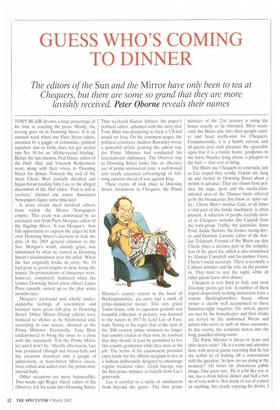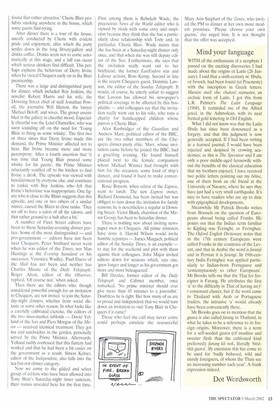GUESS WHO'S COMING TO DINNER
The editors of the Sun and the Mirror have only been to tea at
Chequers, but there are some so grand that they are more
lavishly received. Peter °borne reveals their names
TONY BLAIR devotes a large percentage of his time to courting the press. Mostly, the wooing goes on in Downing Street. It is an unusual week when one Fleet Street editor, attended by a gaggle of columnists, political reporters and so forth, does not get invited into No. 10 for an 'off-the-record briefing'. Before the last election, Paul Dacre, editor of the Daily Mail, and Viscount Rothermere went, along with their wives, to Downing Street for dinner. Towards the end of the meal, Cherie Blair partially disrobed and began breast-feeding baby Leo, to the alleged discomfort of the Mail editor. 'Paul is still in recovery,' claimed one senior Associated Newspapers figure some time later.
A more recent meal involved editors from within the Mirror Newspapers empire. This event was dominated by an extended rant from Piers Morgan, editor of the flagship Mirror. It was Morgan's first full opportunity to express the anger he felt over Downing Street's decision to leak the date of the 2001 general election to the Sun. Morgan's wrath, already great, was stimulated by what be viewed as Downing Street's dissimulation over the affair. When the Sun originally broke its story, No. 10 had gone to great lengths to deny being the source. Its protestations of innocence were, however, completely shattered when the former Downing Street press officer Lance Price casually owned up to the ploy some months later.
Morgan's profound and wholly understandable feelings of resentment and betrayal were given full play in Downing Street. Other Mirror Group editors were reduced to silence as he belaboured and, according to one source, shouted at the Prime Minister. Eventually, Tony Blair endeavoured to bring the issue to a close with the statement: 'I'm the Prime Minister and I don't lie.' Shortly afterwards, Leo was produced (though not breast-fed) and the occasion dissolved into a gurgle of admiration, as hard-bitten Mirror executives oohed and aahed over the prime-ministerial baby.
Other occasions are more businesslike. Two weeks ago Roger Alton, editor of the Observer, led his team into Downing Street. That weekend Kamal Ahmed, the paper's political editor, splashed with the story that Tony Blair was preparing to back a US-led attack on Iraq. On the comment pages, the political columnist Andrew Rawnsley wrote a powerful article praising the adroit way the Prime Minister had conducted his international diplomacy. The Observer trip to Downing Street looks like an effective use of prime-ministerial time: a well-honed and neatly executed softening-up of leftwing opinion ahead of war against Iraq.
These events all took place in Downing Street. Invitations to Chequers, the Prime Minister's country retreat in the heart of Buckinghamshire, are rarer and a mark of prime-ministerial favour. This very grand Tudor house, with its capacious grounds and beautiful collection of pictures, was donated to the nation in 1917 by Lord Lee of Fareham. Noting to his regret that at the start of the 20th century prime ministers no longer had country estates of their own, he resolved that they should at least be permitted to live like country gentlemen while they were in the job. The terms of his endowment provided extra funds 'for the official occupant to live in a fashion deliberately designed to encourage regular weekend visits'. Lloyd George was the first prime minister to benefit from Lee's generosity.
Lee is entitled to a smile of satisfaction from beyond the grave. The first prime minister of the 21st century is using the house exactly as he intended. Most weekends the Blairs pile into their people carrier and head north-west for Chequers. Fundamentally, it is a family retreat, and all guests note with pleasure the agreeable signs that it is a family home: goalposts on the lawn, bicycles lying about, a playpen in the hall — that sort of thing.
The Blairs use Chequers to entertain, just as Lee hoped they would. Guests are rung up and invited by Downing Street about a month in advance. They are drawn from politics, the stage, sport and the media-classinfested area of the Thames basin referred to by the broadcaster Jon Snow as 'spite valley'. Cherie Blair's mother Gale, at all times a vital part of the family machinery, is often present. A selection of people recently invited to Chequers includes Jim Capaldi from the rock-group Traffic, the journalist Anna Ford, Jackie Stewart, the former racing-driver, and Dominic Lawson, editor of the Sunday Telegraph. Friends of the Blairs say that Cherie plays a decisive part in the compilation of the guest list, which is also scrutinised by Alastair Campbell and his partner Fiona, Cherie's social secretary. There is normally a Cabinet minister and his wife on the premises. They tend to stay the night, while all other guests leave after dinner.
Chequers is very hard to find, and most first-time guests get lost. A number of them report desperately seeking instruction from a remote Buckinghamshire house, whose owner is clearly well accustomed to these Saturday-night inquiries. On arrival, guests are met by the housekeeper and then drinks are served by the uniformed Wrens and sailors who serve as staff on these occasions. In due course, the company moves into the long, panelled dining-room.
The Prime Minister is always in 'jeans and shirt-sleeve order'. He is a warm and attentive host. with several guests reporting that he has the verbal tic of kicking off a conversation with the question: 'So how are we doing at the moment?' He belies his abstemious public image. One guest says. He is a bit like you or me, has a drink before dinner and half a bottle of wine with it. Not drunk or out of control or anything, but clearly enjoying his drinks. I
found that rather attractive.' Cherie Blair prohibits smoking anywhere in the house, which some guests find trying.
After dinner there is a tour of the house, usually conducted by Cherie with evident pride and enjoyment, after which the party settles down in the long library/gallery and drinks coffee. Drinks seem not to come automatically at this stage, and a lull can occur which serious drinkers find difficult. This perhaps explains the behaviour of Derry Irvine when he visited Chequers early on in the Blair premiership.
There was a large and distinguished party for dinner, which included Roy Jenkins, the novelist Robert Harris and his wife, the Downing Street chief of staff Jonathan Powell, the journalist Will Hutton, the lawyer Michael Be loft, and wives. The group assembled in the gallery in cheerful mood. Especially cheerful was the Lord Chancellor, who was soon sounding off on the need for 'Young Blair to bring us some whisky'. The first two or three times that Deny Irvine made this demand, the Prime Minister affected not to hear. But Irvine became more and more peremptory. After a fourth assertion that 'it was time that Young Blair poured some whisky for his guests', the Prime Minister reluctantly scuttled off to the kitchen to find Irvine a drink. The episode was viewed with bewilderment by everyone else, and continues to rankle with Roy Jenkins, who felt that Irvine's behaviour was inappropriate. One figure who is close to the Blairs suggests that this episode, and one or two others of a similar nature, caused the Blairs to close ranks. 'They set off to have a salon of all the talents, and that rather ground to a halt after a bit.'
A number of Fleet Street editors have been to these Saturday-evening dinner parties. Some of the most distinguished — and pro-government — editors have not been near Chequers. Peter Stothard never went when he was editor of the Times, nor Max Hastings at the Evening Standard or his successor, Veronica Wadley. Paul Dacre of the Mail has not been and neither has Charles Moore of the Daily Telegraph. Roger Alton, editor of the Observer, replied, 'Of course not,' when asked.
Then there are the editors who, though considered powerful enough for an invitation to Chequers. are not invited to join the Saturday-night dinners, whether from social distaste or some other reason. In what looks like a carefully calibrated exercise, the editors of the two mass-market tabloids — David Yelland of the Sun and Piers Morgan of the Mirror — received identical treatment. They got tea and sandwiches in the garden, personally served by the Prime Minister. Afterwards, Yelland rashly confessed that this flattery had worked and that he had been a bit easier on the government as a result. Simon Kelner, editor of the Independent, also falls into the tea-but-not-dinner category.
Now we come to the gilded and select group of editors who have been allowed into Tony Blair's Saturday-night inner sanctum, their names revealed here for the first time. First among them is Rebekah Wade, the precocious News of the World editor who is viewed by rivals with some envy and suspicion because they think that she has a particularly close relationship with Tony and, in particular, Cherie Blair. Wade insists that she has been at a Saturday-night dinner only once, and that when she was still deputy editor of the Sun. Furthermore, she says that the invitation really went out to her boyfriend, the former EastEnders star and Labour activist, Ross Kemp. Second in line is the recent Chequers guest, Dominic Lawson, the editor of the Sunday Telegraph. It would, of course, be utterly unfair to suggest that Lawson has allowed his newspaper's political coverage to be affected by this hospitality — and colleagues say that the invitation really went out to his wife, who runs a charity for handicapped children whose patron is Cherie Blair.
Alan Rusbridger of the Guardian and Andrew Marr, political editor of the BBC, are the two other members of the Chequers dinner-party elite. Marr, whose invitation came before he joined the BBC, had a gruelling evening. He found himself placed next to the female companion whom Michael Winner had brought with him for the occasion, some kind of ship's dancer, and found it hard to make conversational progress.
Rosie Boycott, when editor of the Express, went to lunch. The new Express owner, Richard Desmond, has been invited but was obliged to turn down the invitation for family reasons; he is nevertheless a regular at Downing Street. Victor Blank, chairman of the Mirror Group. has been to Saturday dinner.
There is nothing new about inviting newspaper men to Chequers. All prime ministers have done it. Harold Wilson would invite humble reporters — James Margach, political editor of the Sunday Times, is an example — to stay for the weekend and plot with them against their colleagues. John Major invited editors down for sessions which, says one, 'grew longer and longer as his government got more and more beleaguered'.
Bill Deedes, former editor of the Daily Telegraph and Cabinet member, once remarked, `No prime minister should ever give more than 45 minutes to a journalist.' Doubtless he is right. But how many of us are so proud and independent that we would turn down an invitation to visit Tony Blair in Chequers if it came?
Those who feel the call may never come could perhaps emulate the resourceful Mary Ann Sieghart of the Times, who invited the PM to dinner at her own more modest premises. 'Please choose your own guests,' she urged him. It is not thought that the offer was accepted.















































































 Previous page
Previous page